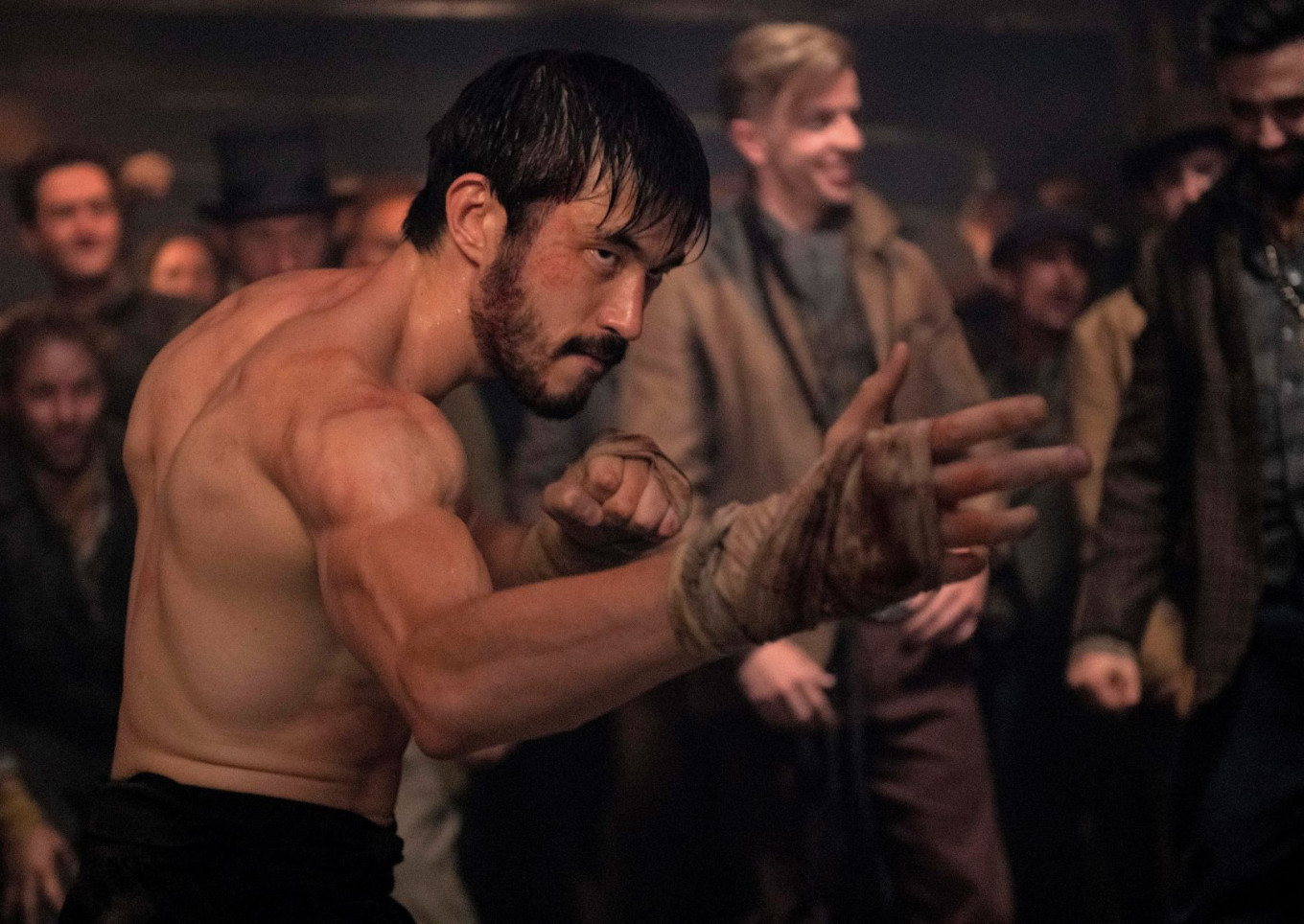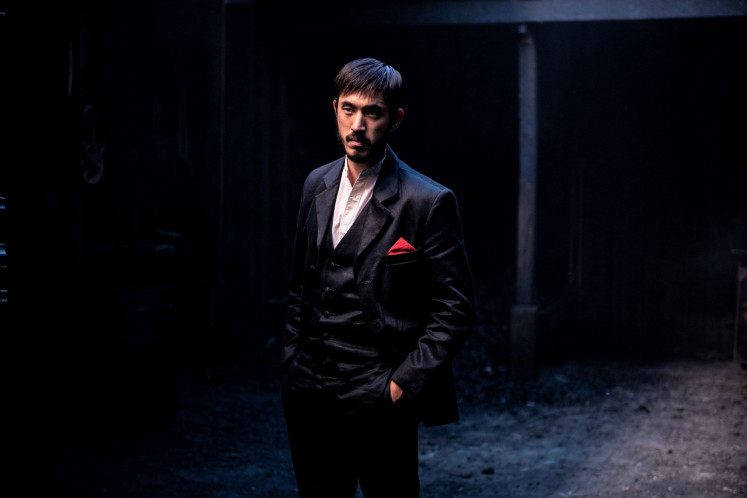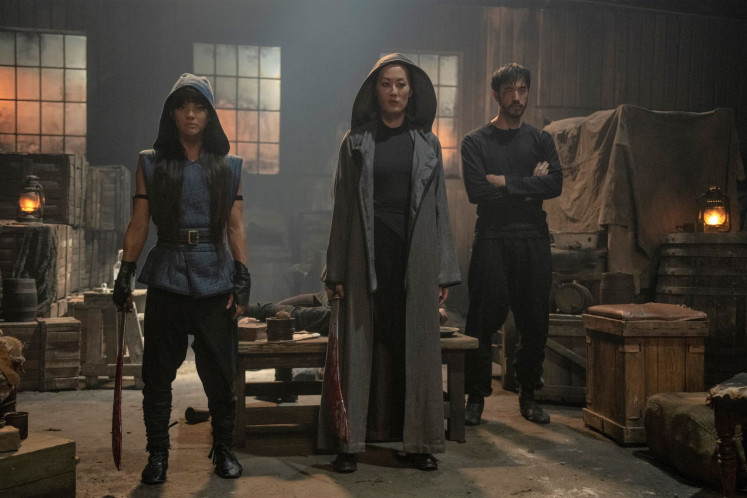Popular Reads
Top Results
Can't find what you're looking for?
View all search resultsPopular Reads
Top Results
Can't find what you're looking for?
View all search resultsAndrew Koji finds his way in ‘Warrior’
Japanese-English actor Andrew Koji nearly quit acting, but is now enjoying the ride in seeing where it leads.
Change text size
Gift Premium Articles
to Anyone
F
or many aspiring actors trying to make it big, there comes a time when self-doubt kicks in, wondering whether the next audition will be the ticket to the world of premieres and galas, or just another day waiting for the call that never comes.
Japanese-English actor Andrew Koji certainly knows this well, having nearly quit acting altogether before he was cast as the lead in Cinemax action-drama series, Warrior. Even better, the network has just renewed the 10-episode series, which saw its Season 2 premiere on Oct. 2.
In a virtual press conference attended by The Jakarta Post, Koji touched upon the conundrum East Asian actors face during casting calls, as they are frequently cast in martial arts roles.
“I think it’s getting better now for sure, with many different projects. For now, I’m just going with the flow, and I guess Warrior did renew my faith and belief in acting and the business as well,” he said.
As stereotypical as associating Asians with martial arts might be, the role is a perfect fit for Koji.
With his background in taekwondo and kung fu, combined with his experience as a stunt performer, no role is better suited for him than that of Warrior’s Ah Sahm, a Chinese immigrant to the United States and martial arts expert who finds himself in the middle of the violent Tong Wars of late 1870s San Francisco – all while searching for his sister who was sold to one of the warring gangs.
Slick, yet soulful: Japanese-English actor Andrew Koji stars in Cinemax’s 'Warrior' as Ah Sahm, a martial arts prodigy and Chinese immigrant who finds himself in the middle of the Tong Wars in 1870s San Francisco. (Courtesy of Cinemax/-)Having performed numerous fight scenes on camera, Koji said he had no ego when going into the process. He clarified that every person certainly had an ego, and he simply wanted to do his best job.
“Before Season One, I was a bit out of shape. I went out, I partied, I was a lad. So with this [role], I had to learn so much of [Ah Sahm’s] physicality,” he said.
Story-wise, Warrior depicts a time when anti-Chinese sentiment is running rampant in the US, with the Chinese Exclusion Act looming over the characters’ heads.
While the plot has its own take on the politics of the era, deeper in its text and subtext, Koji noted that the story was largely a fiction based on history, or as he put it, “a fantasy angle with quite a few artistic liberties”.
In terms of the series’ relevance in the current era, none of the cast and crew could have ever known that the events of 2020 would unfold like they have when filming started in 2019.
“A lot of the politics, they weren’t thinking of it. They were just basing it on the facts and stories they had at the time. So it’s scarier how relevant [Warrior] is now, because there was no intention to go ‘hey, we’ve got a message for 2020’,” he recalled.
The series is also notable for its majority-Asian cast, a natural result given the backdrop for the story.
While discussions on diversity are omnipresent in today’s media and sociopolitical climate, Koji has also been pondering his own experience in the show.
Since his stint on Warrior, he has been able to find work as an actor in pure acting roles, which he had previously thought was something he’d never do.
“Many actors around me, many good friends of mine, they’re still struggling. So I really thought my career might just be making my own films when I can and maybe going into theater and help there somewhere.
“The fact that there’s a show – and I think a good show – and then other jobs since then, I think it’s been such a huge thing because there’s so many talented actors out there, and to realize we’re part of a growing diversity.”
Timely drama?: While 'Warrior' is heavy on action, the dramatic plot is set against the looming background of the Chinese Exclusion Act and the rampant Sinophobia of the era in late-19th century America. (Courtesy of Cinemax/-)In this regard, Koji credits the late actor and martial artist Bruce Lee for the show’s existence.
Lee had envisioned Warrior’s prototype in 1971. Titled simply as The Warrior, the concept was for a television series about a martial artist in the Old West, starring himself in the lead. Lee had trouble marketing The Warrior to major studios and it could be argued that his original concept was reworked as the 1972 series Kung Fu, albeit without crediting him.
Nevertheless, Lee was instrumental in shaping the landscape of America’s film industry for Asian actors to be leading men in their own right.
“We’re just part of, hopefully, the end stage, which is to be diverse and equal. To get to be part of that and actually involved in changing how we are perceived and accepted in certain parts of the world is a real blessing,” Koji said, admitting that he didn’t think that he would be involved in the process at all.
As for his current gig, he was just seeing where the path took him.
“Right now, it’s just to go with the flow and try and work to the best of my abilities for as long as these jobs are coming for me, because I’m sure my time in the spotlight or whatever will come to an end,” he said.
“It comes in peaks and valleys. I think life is like that a lot.” (ste)













